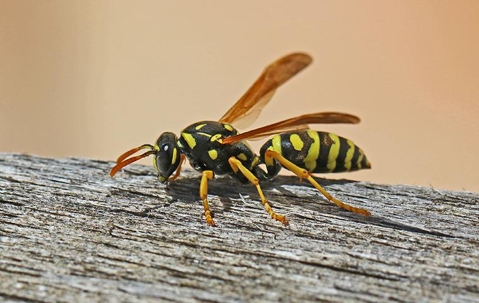Probably when you see a stinging insect flying around, you’re not concerned with the type of insect it is. All you can really think about in the moment is how to keep it from stinging you. Well, wasps are a regular stinging pest in the St. Louis area, so it’s good to know the wasp basics.
Wasp Identification
Though the appearance varies between specific species, wasps generally have a brown coloration with yellow markings on the head, thorax, and abdomen. Their bodies are slender, long, and narrow-waisted. They measure about ¾ to 1 inch in length.
You can usually distinguish a wasps from other similar-looking stinging insects by their thinner, more elongated shape. Their segmented bodies have minimal hair, two sets of wings, and six legs. They are bigger than most bees, but smaller than most hornets.
Beneficial Insects
Although we mostly associate these insects with their painful sting, wasps are actually beneficial to the environment. They act as a natural source of pest control by feeding on small insects, keeping the local pest population in check. Wasps also benefit gardens by helping with pollination as they feed on nectar and transfer pollen from flower to flower.
While that’s all very nice, wasps can also cause serious problems for property owners, especially those with allergies. Something to keep in mind is that wasps don’t die when they sting. Unlike bees, they are able to sting repeatedly, injecting their venom into their prey numerous times. So, those who are allergic to their venom can experience serious, sometimes fatal, reactions, especially if they are stung repeatedly.
Wasp Prevention Tips
In order to protect yourself from the threats of wasp activity, it’s important the take precaution. There are a number of preventative measures you can take to keep them away. Here are some ways in which you can discourage wasps from hanging around your property or getting into your home:
- Apply caulking to seal cracks and crevices around the porch.
- Grow wasp-repelling plants such as wormwood, marigold, mint, basil, and geranium.
- Keep an eye out for wasp nests in sheds, garages, wall cavities, etc.
- Keep trees and shrubs trimmed and well-maintained.
- Maintain your garden and do not have too many flowering plants.
- Make sure to cover up holes in the ground with cement or grass
- Promptly dispose of trash and clean spills when they happen.
- Reduce access to food and never leave food (human or pet food) outside.
- Store garbage in tightly sealed cans and cover any compost piles.
- When possible, keep all doors and windows closed.
These are useful tips in effective wasp-control, however, none of them guarantee results. Although it can be tempting, it’s very important that you do not try and remove an active nest on your own. This is extremely dangerous and can cause severe reactions, compromising your health and well being. If you detect wasp activity on your St. Louis property, the best thing you can do is seek the help of the pest professionals.
Arenz Pest Management Solutions offers safe, effective wasp removal services that protect your property all year long. Whether you currently have a wasp problem or you want more preventative assistance to keep wasps away from your property, give us a call today. We will conduct a thorough inspection, identifying all nests and active areas so we’re familiar with the scope of the infestation. Then we’ll treat problem areas, spray the perimeter, and implement any necessary structural modifications. Our follow-up services promise you continued service for the best protection from stinging insects available in. Call us to learn more.
Tags: wasps | pest prevention | home pest control |
Call Now To Start Protecting Your Family
Complete the form below to schedule your no obligation inspection.

